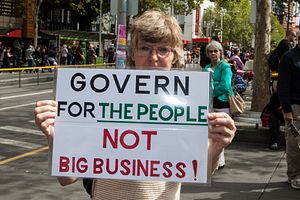Public trust in business and government worldwide has reportedly sunk to its lowest level since the global financial crisis. For Asia’s leaders, the lesson appears as simple as the famous slogan from the Bill Clinton campaign: It’s the economy, stupid.
In its annual trust barometer, public relations consultancy Edelman announced that trust in business, government, media and nongovernment organizations (NGOs) in the general population had fallen below 50 percent in two-thirds of 27 countries surveyed, including the United States, Britain and Japan.
“There has been a startling decrease in trust across all institutions driven by the unpredictable and unimaginable events of 2014,” Edelman president Richard Edelman said. “The spread of Ebola in West Africa; the disappearance of Malaysian Airlines Flight 370, plus two subsequent air disasters; the arrests of top Chinese government officials; the foreign exchange rate rigging by six global banks; and numerous data breaches, most recently at Sony Pictures by a sovereign nation, have shaken confidence.”
Government remained the “least trusted” institution for the fourth straight year, with trust levels below 50 percent in 19 countries. However, business also suffered its worst rating since 2008, with some of the largest declines posted in Australia (down 11 percentage points from 2014 to 48 percent) and Singapore (10 points lower to 61 percent).
In the Asia-Pacific region, emerging economies displayed the most trust in their institutions, led by India (up 10 points to 79 percent), Indonesia (up 6 points to 78 percent), China (down 4 points to 75 percent), and Singapore (down 8 points to 65 percent). Malaysia and Australia stayed in the positive column at 56 percent and 52 percent, respectively, but both lost ground from the previous year’s poll.
However, among the least trustful was Hong Kong, which dived from 59 percent to 47 percent, reflecting recent political turmoil, while South Korea also slipped 4 points to 47 percent. Japan tied with Ireland globally as the least trusting in its institutions, with confidence diving from 44 percent to 37 percent amid the nation’s slide back into recession in 2014.
Overall though, NGOs remained the most trusted in the region at 66 percent, followed by business (63 percent), media (58 percent) and government (56 percent). Despite recent corruption scandals, Chinese showed the most trust in government (82 percent) and the least trust in business (70 percent), while Hong Kong had the most trust in NGOs (63 percent) compared to just 41 percent for its media.
In Japan, the least trust was shown in NGOs at 29 percent, with business earning the highest rating at 48 percent. In South Korea though, NGOs scored the highest rating of 68 percent compared to just 33 percent for government, with its businesses more trusted abroad then at home due to concerns over the dominance of the chaebol.
Examining the region’s least and most trusting publics, Edelman said Japanese had shown increased confidence in the economic outlook under Abenomics, but remained “squeezed between the contradiction of the desire for a more politically and economically robust Japan and the fear and concern over the pain that is needed to achieve that desire.”
In contrast, Narendra Modi’s dramatic election victory “caused even the most died-in-the-wool Indo-pessimists to dust off their rose-colored glasses. Hope is oozing out of every crevice of Indian society and, along with it, resurgent trust.” Indian trust in government jumped a massive 30 points to a new high of 82 percent, tying with China and only trailing the United Arab Emirates (90 percent).
In Indonesia, Joko Widodo’s election victory of 2014 also boosted confidence in government, rising 16 points to reach 65 percent among the general population, with “Jokowi” successfully pushing through fuel subsidy cuts without major protests. However, Edelman said controversies over appointments such as the Attorney General showed the risk of Jokowi’s popularity waning.
“If Indonesians fail to see tangible change or a government once again entangled in the same kind of repeated scandals that embroiled the previous administration, you can bet that this trust advantage will fade away quickly. Worse still, a failure to deliver on the part of Jokowi may well lead to something more dangerous: disenchantment with the democratic process itself,” Edelman warned.
Noting the lack of trust in advanced and democratic economies compared to their emerging rivals, Edelman had a warning for new leaders such as Jokowi and Modi: “…one could argue that governments in developed markets have delivered high levels of economic success over extended periods of time and therefore deserve high levels of trust. The fact that this is not the case suggests that greater success breeds increased demands and that economic development engenders greater – not lesser – expectations.”
Can Asia’s rising stars overcome the diminishing marginal utility of economic gains among their publics? If Japan, South Korea and Australia are any guide, leaders of the emerging economies should make hay while their economic sunshine lasts.

































